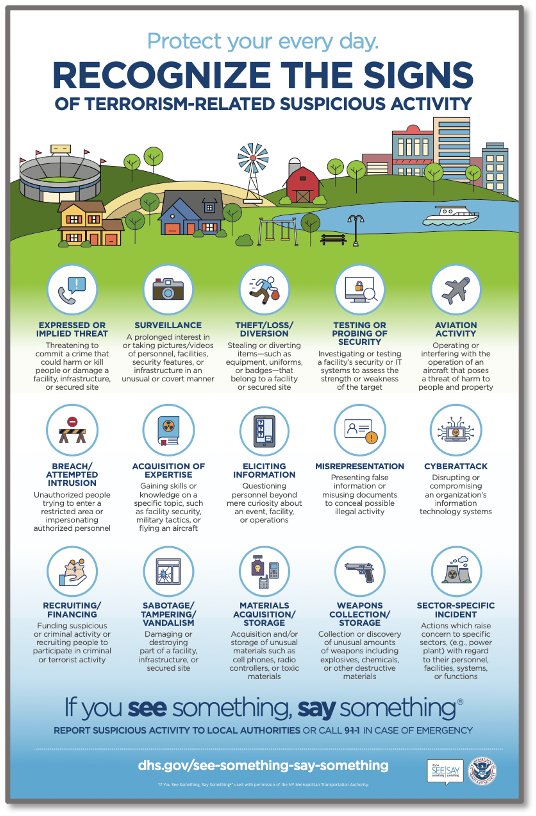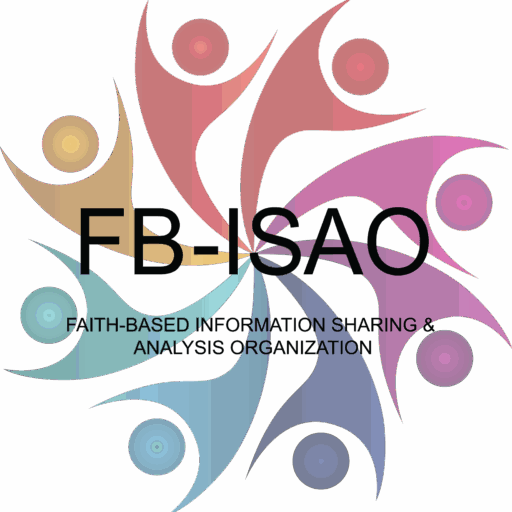25 September marks “If You See Something, Say Something Awareness Day” (#SeeSayDay). The “If You See Something, Say Something®” campaign works year-round to empower and educate the public on suspicious activity reporting. This day also fits within the month of September as National Preparedness Month and highlights the importance of an informed and alert public playing a critical role in keeping the U.S. and communities safe. This day and the campaign in general focus largely on learning the indicators of terrorism-related crimes, paying attention to your surroundings, and reporting suspicious activity to local law enforcement. But it’s greater than just terrorism, it could be any crime or suspicious event that could impact your community. For Faith-Based Organizations (FBOs), who experience a wide-variety of threats and risk, being informed and having a process in place can go a long way to ensuring threats are identified, reported, and appropriate action is undertaken.

There many examples where someone saw something and said something. And likely those incidents ended more favorably than if someone had not reported the suspicious incident. Below are just a few incidents from recent reporting.
A 16-year-old boy and three other people were detained on 16 September in connection with a suspected plan for an Islamic extremist attack on a synagogue in the German city of Hagen, authorities said. The detentions took place on Yom Kippur, the holiest day in Judaism, and two years after a deadly attack in another German city on the Yom Kippur holiday. Police cordoned off the synagogue on Wednesday and a worship service planned for the evening was called off. Officials had received ‘very serious and concrete information’ that there could be an attack on the synagogue during Yom Kippur, said Herbert Reul, the interior minister of North Rhine-Westphalia state, where Hagen is located. The tip pointed to ‘an Islamist-motivated threat situation,’ and named the possible timing and suspect, he added.”
In the days leading up to the 6 January 2021 incident at the U.S. Capital, the founder and administrator of an obscure website about underground infrastructure in Washington, D.C., saw a sudden and suspicious spike in traffic. WashingtonTunnels.com details “the history of underground tunnels and pipe systems in the nation’s capital” and maintains a “narrow but devoted following among D.C.-area history and city planning buffs.” The site also includes maps and details of the underground transit rail system, along with water and sewer systems. Also of particular note in this case was that the site included maps of the underground tunnels on the Hill, which connect the Capitol building to House and Senate Office Buildings, the Library of Congress and the Capitol Visitor Center. So, while all site administrators love to see increases in site visits, the increase was so sharp and coming from sites that weren’t the usual for the website’s visitors, that the individual felt it necessary to reach out to the FBI. The individual had enough awareness ahead of the electoral college count coming up in January that he was worried “people were covertly seeking escape routes or entry points to the Capitol.” A couple areas triggered the concern above and beyond the increase in web traffic:
- Traffic on the website is usually limited to visitors and referrals from people in D.C. and the larger Maryland and Virginia areas, better known as the DMV. But starting on New Year’s Day, a spike in traffic included visitors nationwide.
- A deeper review of analytics revealed many of the clicks were coming from hyperlinks shared on anonymous message boards, sites and forums named after militias or firearms, or using Donald Trump’s name.
While the individual did not directly hear back from the FBI, it was mentioned in the U.S. Senate Rules and Homeland Security committees’ June 2021 review of the U.S. Capitol insurrection. The committees’ joint report said an “online tip” was “received by the FBI National Threat Operations Center of a ‘significant uptick’ in new visitors to the website WashingtonTunnels.com.”
On 14 March, 2021 just before a service at the First Baptist Church in Brevard, North Carolina was set to begin, the security team noticed suspicious activity outside their facility through their security cameras. Upon further investigation, it was determined that there was an unknown type of device left outside. The church informed the Pastor, and then called the police. After the device was confirmed, the police cordoned off and evacuated the immediate area. Ultimately, the police confirmed that there were in fact several explosive devices, initially assessed as approximately 20, and the incident was called a “serious threat”. The church is also located near the Transylvania County Community Services building. Police also report finding a device on the American Legion property, which is adjacent to the county building’s parking lot. Upon further investigation, a man was identified and arrested but no motive has been publicly identified at the time of this writing. As the investigation continued, of the additional devices, the number was revised to less than ten; the device by the church was the only one that was intact and the others had been exploded already.
In the spirit of “If You See Something, Say Something Awareness Day”, some helpful reminders include:
- Learn the indicators of terrorism-related suspicious activity and share this webpage on social media with #SeeSayDay to encourage others to do the same.
- Learn how to report suspicious activity in your state. Share the reporting information with friends, family, or colleagues to help make your community safer.
- Test your awareness by taking The Challenge and encourage others to test their observance skills as well.
- Host an event. Facilitate an event or training, such as a panel discussion or member/employee education event, to foster conversation about suspicious activity and how to recognize and report it. For FBOs this can also be a great way to build a relationship with neighbors and local law enforcement. Have them come present, share ideas, serve as a panelist, or just be there. This can go a long way to strengthening relationships.
An informed and alert public plays a critical role in keeping our communities safe. By paying attention to your surroundings, and reporting suspicious activity to local law enforcement, you can help keep your community safe.


